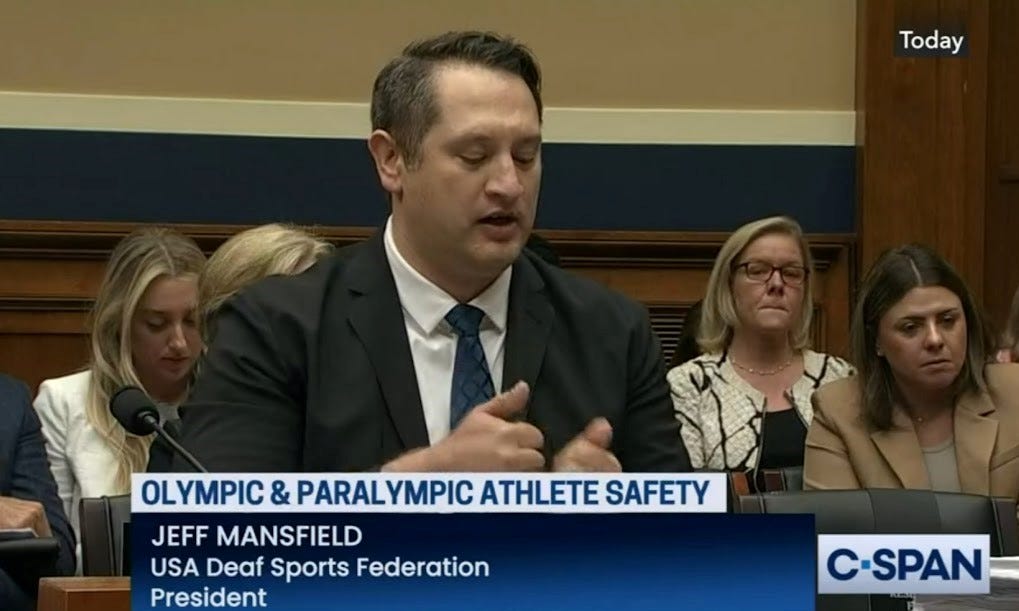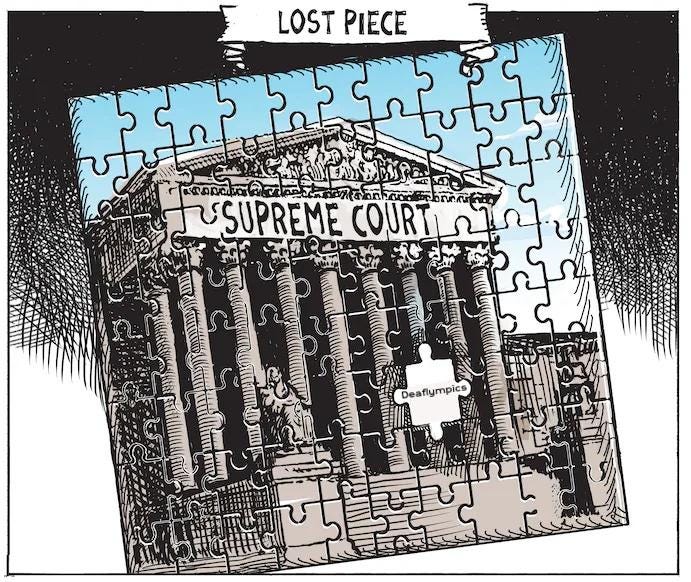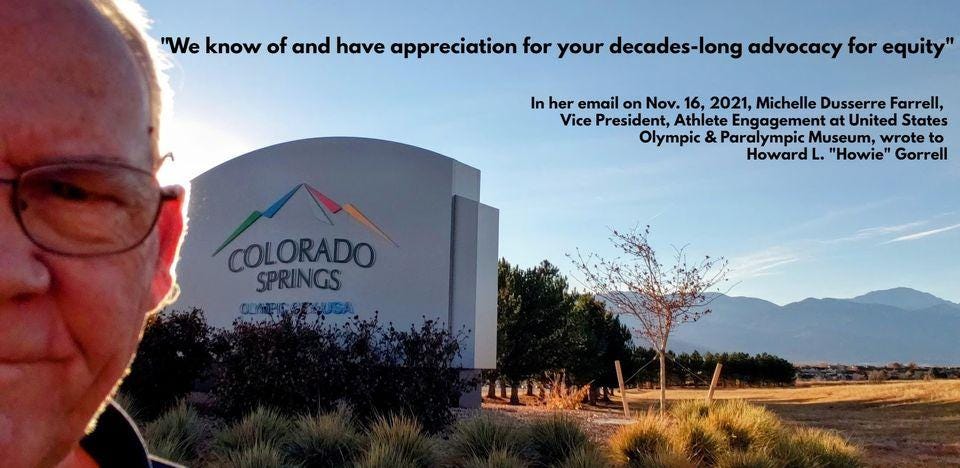2024 - Will CSUSOP Recommend It? Or Not?
The Deaf community, the forgotten Deaflympians, and friends of Deaflympians are waiting to know whether the Commission on the State of U.S. Olympics and Paralympics (CSUSOP) would recommend Congress to amend the Deaflympics into the Ted Stevens Olympic and Amateur Sports Act of 1998. Their final report for Congress will come out this spring!
This is my crying plea to the CSUSOP members to read what a former President of the International Committee of the Sports for the Deaf (ICSD), Donalda Ammons,

wrote below in her public comment to CSUSOP.
"To achieve these environments, I resolutely believe it is necessary for Congress and the USOPC [United States Olympic and Paralympic Committee] to establish funding mechanisms and implement structural reforms—including revising the Ted Stevens Olympic and Amateur Sports Act to insert the Deaflympics alongside the Olympics and the Paralympics so that Deaf and Hard of Hearing Americans are better protected from abuse, mistreatment, and discrimination and are afforded equal access to the provisions of the Act as covered under the Americans with Disabilities Act."

On September 6, 2023, USADSF President Jeffrey Mansfield testified before the CSUSOP in a public hearing in Washington, DC.
Thank you, commissioners. My name is Jeffrey Mansfield. As a three-time Deaflympian, I am honored to be here today as President of the U.S.A. Deaf Sports Federation. USADSF is the national governing body of deaf sports in the United States, a member of the International Committee of Sports for the Deaf (ICSD), and the USOPC's Affiliate Organizations Council. In short, USADSF is to the Deaflympics what the USOPC is to the Olympics and Paralympics.
The summer and winter Deaflympics are quadrennial events administered by the ICSD. In 1955, the IOC recognized the ICSD as an international federation with Olympic standing, and in 2001 IOC granted ICSD the right to use the term ‘Deaflympics.’ However, the Ted Stevens Olympic and Amateur Sports Act makes no provision for the Deaflympics. This omission is at the crux of three issues I highlight today as they relate to the movement and to the rights of deaf and hard-of-hearing Americans.
The first relates to access and compliance. While it is true that deaf and hard-of-hearing athletes can and do take part in the Olympics and Paralympics, the USOPC only tracks categories of disability that are covered under the Paralympics, and deafness is excluded. Because of this technicality, Becca Meyers, a deaf-blind Paralympian, was denied reasonable accommodations and was pressed into making the decision to withdraw from the 2021 Tokyo Paralympic Games. In addition, compliance with the Americans with Disabilities Act is not an explicit criteria for NGB certification. While some NGBs have implemented policies and initiatives to better serve deaf and hard-of-hearing athletes – U.S. Soccer, for example, fully funds the U.S. deaf national teams under the Extended National Teams program – others have not. Consequently, we have a sports landscape where ADA compliance is piecemeal, inconsistent, and neglected. In reality, discrimination, abuse, and mistreatment take place at every level from grassroots youth sports to high-performance sports.
Second, the Empowering Olympic and Amateur Athletes Act is important legislation that champions athlete safety. However, we also caution that the continued omission of the Deaflympics from the Sports Act mandate perpetuates a sports infrastructure that fails to protect the health, safety, and well-being of deaf and hard-of-hearing Americans.
Because deaf and hard-of-hearing athletes are often isolated in sports at every level, anxiety around self-advocacy, for fear of stigmatization and repercussions on playing time and opportunities to advance, have prevented athletes from recognizing and reporting wrongdoing. What results is an environment where deaf and hard-of-hearing athletes are more vulnerable to physical, psychological, and sexual abuse and mistreatment. These factors make the exclusion of the Deaflympics and Deaflympians a public-health issue.
Third is the issue of unequal opportunity. Neither the Amateur Sports Act nor the U.S. Copyright Office recognized the term "Deaflympics" as the ICSD's intellectual property, even though the IOC has granted ICSD the right to use this term. This creates a double injustice, in which the USOPC provides zero funding to the U.S. Deaflympic program and we are precluded from pursuing a wide swath of sponsor funding. Meanwhile, Deaflympic medalists are also excluded from the USOPC Operation Gold awards.
A growing number of countries, including Russia, now fund their national Deaflympic programs with results that translate on the medal table. We believe that the lack of investment in the United States Deaflympic program reflects poorly on the Olympic and Paralympic brand in the United States, undermines national pride, and exacerbates inequality.
In front of me are over 2,000 pages of documents that we have submitted to the Commission. These documents chart a pattern several decades long of deflection, dismissiveness, and denial that can be described as discrimination on the basis of a specific disability, deafness. Today we are calling on the USOPC and Congress to end this pattern and to uphold compliance and athlete safety and equality for deaf and hard-of-hearing Americans.
I urge for the insertion of the Deaflympics into the Ted Stevens Olympic and Amateur Sports Act and to USOPC's mandate and for the investment in Deaflympians. As Deaflympians, we are proud to wear the letters “U.S.A.” across our chests, and today we are calling on our country to have our backs. Nothing about us without us. Thank you for your time.
Watch the video on how Donalda Ammons won the IOC approval for using “Deaflympics.”
Now, the 26-year-long request is in the hands of the CSUSOP members.

~~~~~~~~~~~~~~~~~~~




